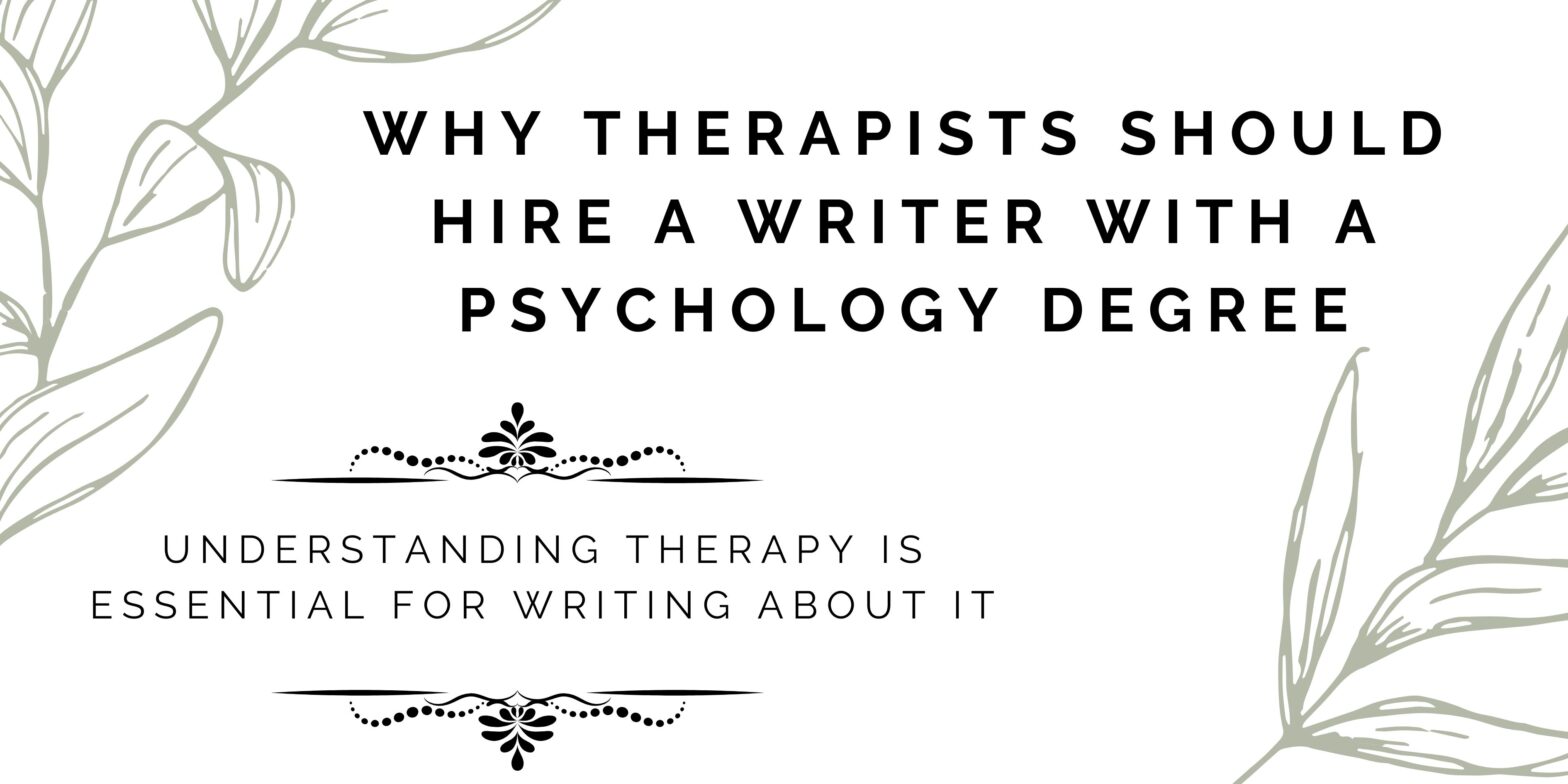Understanding Therapy Is Essential for Writing About It
In today’s digital world, therapists need a strong online presence to connect with potential clients. A well-written website, compelling blog posts, and engaging newsletters all play a crucial role in building trust before a client ever reaches out.
But here’s the challenge: writing about therapy isn’t like writing about any other business.
Your words need to be clinically accurate, ethically responsible, and emotionally attuned to the people seeking your help. Generic content written by someone who doesn’t understand therapeutic modalities, client concerns, or the ethics of mental health communication can do more harm than good.
That’s why hiring a writer with a psychology degree—someone who truly understands the field—can make all the difference.
Learn More About My Writing Services for Therapists
The Problem With Generalist Writers for Therapy Websites
Many therapists turn to marketing agencies or freelance copywriters to develop their website content. While these professionals may be skilled in writing or SEO, they often lack the psychological expertise necessary to communicate therapy concepts effectively.
This leads to problems such as:
- Overpromising or Misleading Language – Some marketing writers unknowingly use wording that could be ethically questionable for a therapy practice. Phrases like “guaranteed results” or “cure your anxiety fast” may attract clicks but violate professional ethics.
- Surface-Level Content – A generalist writer might be able to summarize what CBT or EMDR is, but can they articulate the nuances that differentiate your practice? Without a psychology-trained writer, most content remains broad, impersonal, and disconnected from real client concerns.
- Missed Therapeutic Connection – Therapy is a relationship-based profession. A writer with formal training in psychology knows how to capture your therapeutic voice and ensure your content reflects the way you actually work with clients.
How a Writer With a Psychology Degree Makes a Difference
Hiring a psychology-trained writer means working with someone who understands:
✔ Therapeutic Modalities – A writer with a psychology degree can accurately describe CBT, ACT, somatic therapy, psychodynamic work, trauma-informed care, and more, ensuring your website speaks directly to the clients who need your services.
✔ Client Needs & Emotional Language – A writer with formal training in psychology understands how to validate client experiences and use language that builds trust, rather than sounding overly clinical or detached.
✔ Ethical Considerations – The mental health field has unique ethical marketing boundaries that many generalist writers are unaware of. A psychology-trained writer ensures your content aligns with HIPAA considerations, informed consent principles, and non-pathologizing language.
✔ SEO for Therapists Without Compromising Clinical Integrity – Search engine optimization (SEO) is important, but therapists can’t afford to use clickbait or misleading tactics. A psychology-trained writer balances SEO best practices with ethical, professional writing.
The Impact of High-Quality, Psychology-Informed Writing
Therapists who invest in professionally written content by a writer with a psychology degree see results such as:
- Higher Client Engagement – Content that resonates with potential clients leads to more inquiries and session bookings.
- Better Search Engine Visibility – A blog that provides credible, insightful content ranks higher on Google, helping clients find you through organic search.
- More Referrals & Credibility – When your website clearly communicates your expertise, other professionals are more likely to refer clients your way.
- Stronger Brand Identity – A well-crafted website and blog establish a clear, authentic voice that reflects your unique therapeutic approach.
- Increased Trust Before the First Session – Clients often read about therapists before reaching out. A professional, psychology-informed website helps potential clients feel more comfortable taking that first step.
- Time Savings for You – Writing effective content takes time. Outsourcing it to a skilled writer means you can focus on therapy instead of struggling with website updates.
- Content That Educates, Not Just Sells – Thoughtful blog posts and newsletters position you as a knowledgeable, ethical professional—not just a service provider.
- Better Retention of Existing Clients – Consistent, engaging content (such as newsletters or educational blog posts) helps maintain relationships with current and past clients.
Bringing It All Together: A Writer Who Understands Therapy & Marketing
When hiring someone to write your blog, website, or therapist bio, you want a writer who is both:
📖 Trained in Psychology – More Than Just Words
A writer with a formal education in psychology understands more than just terminology—they grasp the depth and nuance of therapy. This ensures that your content is:
- Clinically Accurate – Whether explaining CBT, EMDR, or somatic therapy, the content must reflect evidence-based practices while remaining accessible to potential clients.
- Ethically Responsible – A psychology-trained writer understands HIPAA-sensitive language, the ethics of self-disclosure, and how to avoid making misleading claims. This ensures your website remains both legally and ethically sound.
- Client-Centered – Therapy is deeply personal. Your website and blog must reflect the language and tone that helps clients feel understood rather than overwhelmed with jargon. A writer with psychology training knows how to validate concerns, normalize experiences, and encourage help-seeking behaviors.
📢 Experienced in SEO and Digital Marketing – Making Sure Clients Find You
A well-written website won’t help your practice if no one sees it. That’s where SEO expertise comes in. A writer who understands search engine optimization and content strategy ensures that:
- Your Website Ranks for Relevant Keywords – Search engines like Google prioritize well-structured, informative content. A skilled SEO writer will ensure your pages appear when potential clients search for “trauma therapist near me,” “CBT therapy for anxiety,” or “mindfulness-based therapy.”
- Your Blog Drives Organic Traffic – Consistently publishing SEO-optimized blog posts increases your website’s visibility, bringing in new potential clients without relying solely on paid ads or social media.
- Your Content Encourages Action – A psychology-trained, SEO-savvy writer knows how to structure content to gently guide visitors toward booking a consultation. This includes well-placed calls to action (CTAs) that encourage the right next steps.
A Writer With Both Skills Bridges the Gap
Many marketing writers are skilled at SEO but lack the clinical knowledge to accurately represent your practice. On the other hand, therapists themselves may understand the psychology but struggle with writing in a way that is both engaging and optimized for search engines.
That’s where hiring a writer with formal training in psychology and experience in SEO-driven content makes all the difference. They ensure that your website:
✔ Accurately reflects your practice and therapeutic approach
✔ Ethically informs and reassures potential clients
✔ Ranks well on Google, helping the right clients find you
A psychology-informed, SEO-experienced writer doesn’t just write about therapy—they write in a way that connects, builds trust, and brings the right clients to your practice.
About Me & How I Can Help

I’m Kathryn Vercillo, a writer with a Master’s degree in Psychological Studies from CIIS, and I specialize in content writing for therapists.
I’ve worked with therapy collectives, private practices, and mental health organizations to create SEO-optimized blog posts, therapist bios, and website page content that attracts the right clients while staying true to therapeutic ethics.
If you’re ready to elevate your website content without the stress of writing it yourself, I’d love to help.
